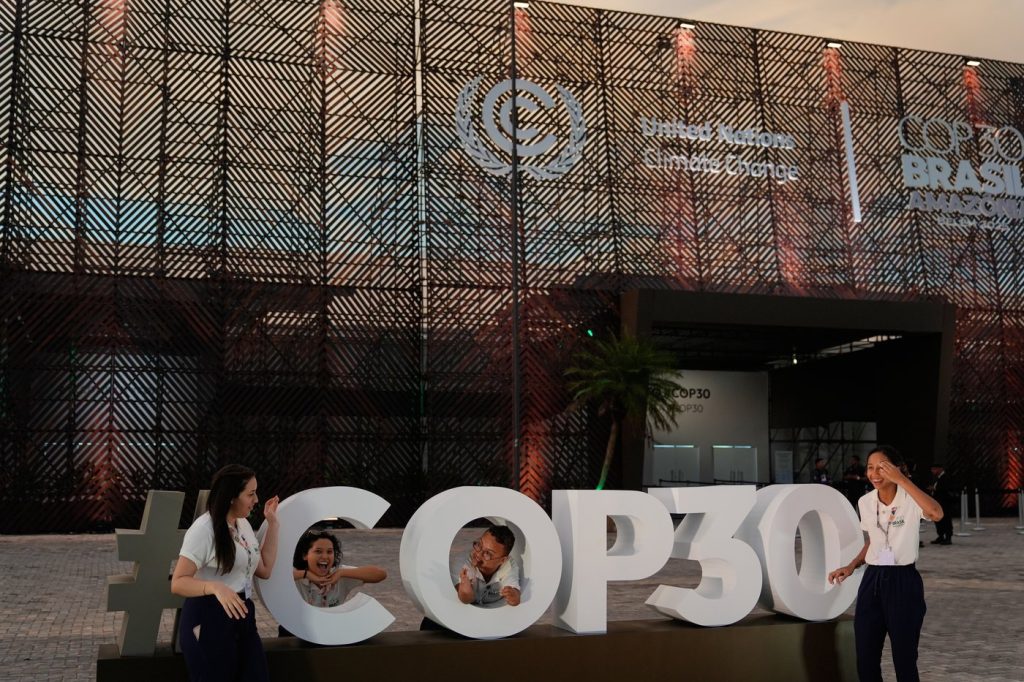World
Climate Negotiations Launch in Brazil Amid Urgent Calls for Action

U.N. climate negotiations commenced on March 18, 2024, in Belem, Brazil, with leaders emphasizing the need for urgent action and collaboration to combat global warming. This year’s conference, known as COP30, highlights more than three decades of efforts to significantly reduce carbon emissions globally. André Corrêa do Lago, the president of COP30, stressed the importance of unity, using the Brazilian term “mutirão,” which signifies a collective effort to tackle shared challenges.
In a letter addressed to negotiators, do Lago warned, “Either we decide to change by choice, together, or we will be imposed change by tragedy.” He underscored the necessity of collective action in addressing climate issues, stating, “We can change. But we must do it together.”
U.S. Absence Complicates Negotiations
The absence of the United States from high-level negotiations adds complexity to the calls for unity. The Trump administration’s decision to withdraw from the Paris Agreement for the second time has cast a shadow over the proceedings. While the U.S. has historically contributed more carbon dioxide emissions than any other nation, China has now overtaken it as the leading carbon polluter. Nonetheless, the long-term impact of U.S. emissions remains significant, as carbon dioxide persists in the atmosphere for at least a century.
Ambassador Ilana Seid of Palau, chair of the Alliance of Small Island States, expressed concern over the geopolitical challenges affecting the negotiations. “The United States withdrawing from the Paris Agreement has really shifted the gravity of the whole negotiating system,” she stated. Small island nations are particularly vulnerable to climate change, with rising sea levels threatening their very existence.
Todd Stern, former U.S. Special Envoy for Climate, echoed these sentiments, asserting that the current U.S. stance undermines efforts to combat climate change. He remarked, “It’s a good thing that they are not sending anyone. It wasn’t going to be constructive if they did.”
Grassroots Initiatives and Local Action
Despite the U.S. federal government’s withdrawal, many cities, states, and businesses across the country are reportedly taking on roles to mitigate climate change. Katharine Hayhoe, chief scientist at The Nature Conservancy, likened the negotiations to a potluck dinner, where participants contribute their efforts to reduce carbon emissions. “It’s obvious who took the time to bake the fresh pie with fruit that they picked and who fished out that year-old frozen chicken nuggets,” she said, highlighting the varying levels of commitment among nations.
In a letter to negotiators, Simon Stiell, the U.N. climate chief, acknowledged the partial successes of the Paris Agreement but called for accelerated action, particularly in the Amazon region. He noted, “Devastating climate damages are happening already, from Hurricane Melissa hitting the Caribbean to super typhoons smashing Vietnam and the Philippines.” Stiell emphasized the need for nations to connect climate action to the realities faced by people worldwide.
As COP30 progresses, the pressure is mounting for global leaders to take decisive steps toward meaningful climate action. The absence of the U.S. adds a layer of complexity, but the commitment of other nations and local entities remains crucial in the fight against climate change.
-

 Science3 months ago
Science3 months agoToyoake City Proposes Daily Two-Hour Smartphone Use Limit
-

 Top Stories3 months ago
Top Stories3 months agoPedestrian Fatally Injured in Esquimalt Collision on August 14
-

 Health3 months ago
Health3 months agoB.C. Review Reveals Urgent Need for Rare-Disease Drug Reforms
-

 Technology3 months ago
Technology3 months agoDark Adventure Game “Bye Sweet Carole” Set for October Release
-

 World3 months ago
World3 months agoJimmy Lai’s Defense Challenges Charges Under National Security Law
-

 Lifestyle3 months ago
Lifestyle3 months agoVictoria’s Pop-Up Shop Shines Light on B.C.’s Wolf Cull
-

 Technology3 months ago
Technology3 months agoKonami Revives Iconic Metal Gear Solid Delta Ahead of Release
-

 Technology3 months ago
Technology3 months agoApple Expands Self-Service Repair Program to Canada
-

 Technology3 months ago
Technology3 months agoSnapmaker U1 Color 3D Printer Redefines Speed and Sustainability
-

 Technology3 months ago
Technology3 months agoAION Folding Knife: Redefining EDC Design with Premium Materials
-

 Technology3 months ago
Technology3 months agoSolve Today’s Wordle Challenge: Hints and Answer for August 19
-

 Business3 months ago
Business3 months agoGordon Murray Automotive Unveils S1 LM and Le Mans GTR at Monterey









